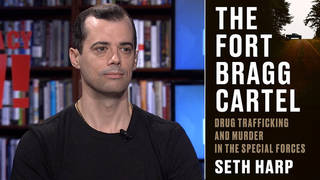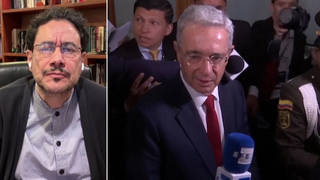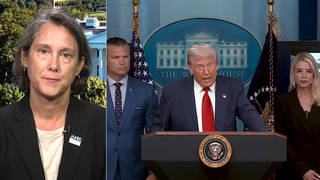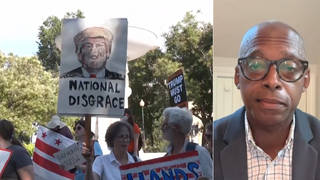
We speak with director Santiago Mitre about “Argentina, 1985,” his dramatization of the Trial of the Juntas, when a civilian court prosecuted Argentina’s former military leaders for brutal crimes committed during the U.S.-backed right-wing military dictatorship from 1976 to 1983. The film won a Golden Globe for Best Motion Picture in a Non-English Language and is also nominated for an Oscar for best international film. Mitre talks about following the landmark trial in Argentina as a boy, just a short time after the end of the dictatorship, and why he felt compelled to tell the story as a filmmaker. “The decision of the government to do this trial was very brave and very important, and it founded the basis of the new democracy,” says Mitre.
Transcript
AMY GOODMAN: We begin today’s show looking at the new film Argentina, 1985 about the Trial of the Juntas, the civilian court that prosecuted Argentina’s former military leaders for brutal crimes committed during the U.S.-backed right-wing military dictatorship from 1976 to '83. The film is based in part on the story of Julio Strassera and Luis Moreno Ocampo, who prosecuted the Argentine generals. Ocampo later became the first prosecutor of the International Criminal Court. He'll join us later in the show.
Argentina, 1985 has been shortlisted for an Oscar and just won a Golden Globe for Best Motion Picture in a Non-English Language. This is a part of the film director Santiago Mitre’s acceptance speech at the Golden Globes.
SANTIAGO MITRE: I want to share this with all the people who, since the dictatorship, have been fighting to build a better democracy in Argentina, and they keep on fighting. And, well, I think democracy is something that we need to — well, we need to keep on fighting for.
AMY GOODMAN: Santiago Mitre, director of Argentina, 1985. The film was also just awarded the NBR Freedom of Expression Award from the National Board of Review. Other winners of the awards included the famed director Steven Spielberg and the film Top Gun: Maverick. In a moment, we’ll be joined by Santiago Mitre, but first let’s turn to the trailer of Argentina, 1985.
RUSO: [played by Norman Briski] [translated] You will be the prosecutor in the most important trial in Argentine history.
ABDUCTEE: [translated] I was abducted from my home. They kept me a prisoner for months.
TEXT: Since the Nuremberg trials.
LUIS MORENO OCAMPO: [played by Peter Lanzani] [translated] The responsibility of command lies with the juntas. We must prove they knew about it.
TEXT: No country has dared to prosecute a dictatorship.
JULIO CÉSAR STRASSERA: [played by Ricardo Darín] [translated] This is our opportunity.
RUSO: [translated] Be careful, Julio. Be careful.
TEXT: Until Argentina, 1985.
JAVIER: [played by Santiago Armas Estevarena] [translated] You’re sending Videla to jail?
JULIO CÉSAR STRASSERA: [translated] All of those responsible.
UNIDENTIFIED: [translated] There is little time. You won’t pull this alone.
JULIO CÉSAR STRASSERA: [translated] How many trials have you worked?
LUIS MORENO OCAMPO: [translated] None.
JULIO CÉSAR STRASSERA: [translated] Ninety percent of the judiciary staff does not want to get involved.
LUIS MORENO OCAMPO: [translated] Ninety-nine percent. I think we need to look elsewhere.
JULIO CÉSAR STRASSERA: [translated] Where? Kids?
LUIS MORENO OCAMPO: [translated] Yes. If the seniors won’t do it…
SOMI: [played by Claudio Da Passano] [translated] Then, we bring the juniors in.
TEXT: Inspired by a true story.
LUIS MORENO OCAMPO: [translated] We need to prove it was a systematic plan, that it was across the country, during the governments of all the commanders. They disappeared people, everywhere. They are responsible.
UNIDENTIFIED: [translated] This is about what the country needs.
TEXT: This fall.
SILVIA: [played by Alejandra Flechner] [translated] What are you afraid of?
JULIO CÉSAR STRASSERA: [translated] Everything! Of this being a trap! Of something happening to any of you.
TEXT: True courage.
JULIO CÉSAR STRASSERA: [translated] They broke into our home, and the trial is in an hour.
TEXT: Cannot be intimidated.
POLICE OFFICER: [translated] Police! Open the door!
MARÍA KUBIK: [played by Natalia Olabe] [translated] Your honor, all I want to know is if my daughter is dead or alive.
JULIO CÉSAR STRASSERA: [translated] Slowly, so that we wouldn’t notice, a machinery of horror unleashed its iniquity over the unaware and the innocent.
History was not made by guys like me.
AMY GOODMAN: That’s the trailer for Argentina, 1985.
Well, on Thursday, Democracy Now!'sNermeen Shaikh and I spoke to the film's director, Santiago Mitre, just after he had won the Golden Globe. I began by asking him what it means at an international level for Argentina, 1985 to win that award on the way to the Oscars.
SANTIAGO MITRE: Well, it was an amazing and huge honor, of course. The Golden Globe award and the honor of being shortlisted in the Oscar amplifies the reach out of the film, which is an incredible thing, not only because it means that many people across the globe are going to watch it, but because these people, especially young generations, who are the ones we are trying to reach the most, like the movie does itself, will be able to have conversations about the impact of the film, about its relevance, about the situation of democracy, and about the fragility of democracy nowadays, which I think is one of the things that we need to care about a lot.
NERMEEN SHAIKH: Santiago Mitre, you were, yourself, just a young boy when this trial was taking place in 1985. Explain why you wanted to make a film on it, how you decided to do that, and then how you went about conducting the research. This was one of the most significant events in Argentines’ political history, Argentina’s political history.
SANTIAGO MITRE: Yeah, it’s a — I mean, I had a lot of admiration of the trial — for the trial. It’s a major event, because of the context it was done. It was done only one year after the dictatorship ended, and the militaries were still very powerful and very frightening. All the region was still governed by military dictatorships. So the decision of the government to do this trial was very brave and very important, and it formed the basis of the new democracy. The prosecutors, the judges were brave on doing this, because it’s something — it was something risky. They didn’t know where it was going to end.
And among all the witnesses who survived to the concentration camps, and the families that fight and tried to bring truth during the dictatorship and tried to ask for where their relatives were, and sat down and gave testimony, while most of the people who ran the repressive system were still free — well, I think the trial had so many layers and so many things worthy of being told nowadays to the Argentinian audiences, who were starting to forget about this event, and to the audiences around the world, who could be interested on the subjects that the film was bringing — could bring justice, democracy, is something that — one of the topics that I think we need to be discussing the most nowadays, well, because of what’s happening all over the world — the war in Ukraine, what just happened one week before in Brazil with the attempted coup d’état to Lula, well, the January 6 here, and so many places where too many anti-democratic speeches are growing all over the world.
NERMEEN SHAIKH: And, Santiago Mitre, for people who don’t know, you know, the history of this period, the period of the successive military juntas from 1976 to 1983, and what exactly happened during the so-called Dirty War, could you just give us some background of what was happening then?
SANTIAGO MITRE: Yeah, well, it was part of the late Cold War, let’s say. Argentina had 100 years of a history of alternation between one democratic government, who would not be ended, to a military government. This military government was the most terrible one that happened in history, because it shot, killed and disappeared as a system to all the citizens who were against them politically, or being suspected of being against them. They disappeared over 3,000 people during those years and killed some more. Well, it was an awful dictatorship and awful moment to live in that country and very frightening.
AMY GOODMAN: Santiago, you have said, “I’m convinced of fiction’s capacity to transmit reality.” You decided to make this not a documentary, though you did use verbatim the testimony of the victims, the heartrending, utterly painful testimony of the victims at the trial. But you — for example, Ricardo Darín, one of the most famous Argentine actors, plays Julio Strassera, becomes him, in a sense, even though they don’t actually look alike. Talk about that choice to make this dramatic feature film.
SANTIAGO MITRE: I believe that fiction is probably the best vehicle to tell the truth. And I did a very long research. For many years, I tried to spoke to most of the people who did the trial or who participated in the trial, journalists who were covering the trial for newspapers, witnesses, families of witnesses, all the prosecutorial team, Luis Moreno Ocampo himself, the judges, people from the government. I read everything.
The testimonies could not — I don’t know why. I think it was — I think that I have my ethics as a filmmaker. I couldn’t change a word from what was said during the hearings. The importance that this film transmitted so much truth, I think it was one of my goals. So, luckily, we were able to shoot in the real courtroom where the trial happened. For so many years, we were not — when we wanted to watch images of the Trial of the Juntas, we were not being able to watch the faces of the people who were giving testimony. And, for me, the possibility of recreating this gave me that, like, OK, we can see the faces, and we can try to imagine the pain, the anger, what they were feeling at the moment they were giving testimony.
NERMEEN SHAIKH: Santiago, at the time, do you remember, what was — or, from what you’ve heard, obviously — as you said, you were a child when the trials actually occurred. And your mother was involved in justice, so, obviously, you were more familiar with it than most. What was the impact that this trial had, the trial which was publicly accessible? And, of course, there was a large public that saw the — that was there, present at the trial. What was the impact on society at large, people who knew very little of what had been happening? What was the response?
SANTIAGO MITRE: Yeah, it’s very interesting, because everybody — the president, Alfonsín, won because he said he wanted to do the trial. And he promised something, and then he did it, which was something that not many politicians do. But at the same time, society were afraid of the trial, in a way. They wanted a trial, but they were afraid. They were afraid that a coup d’état could happen. So it was like a tense situation.
It was a big box of amplification, this trial, that made the people conscious of what they had done and about how important it was that we all, as a society, fight for the democracy. Actually, some months after the trial ended, some rebellions in military cuarteles — I don’t know the word in English, like forts or military places — all of the country started, and the people massively went out to the streets to protect this democracy.
AMY GOODMAN: Tell us, Santiago, about the extras in this film. I mean, you used the verbatim testimony, but, of course, actors and actresses, of the victims. In one of your showings here in New York, you talked in the Q&A about the woman who was forced to give birth alone. Tell us her story and the reaction of the extras behind.
SANTIAGO MITRE: Yeah, it’s one of the probably more — the testimonies that has more pain in it. It’s terrible. It was a physician, who was called Adriana Calvo de Laborde, who was forced to give birth handcuffed — handcuffs, se dice [inaudible] — handcuffed in the back of a police car. And they didn’t let her grab his daughter who was just born. Well, and we were doing that testimony, that, for me, it was one of the main testimonies during that sequence. And I worked a lot with the actress to get the right tone, similar to the real Adriana but with her own deepness. And we cut her hair. Her clothes were exactly the same, because we were mixing this footage with — our footage with the original footage from the trial. And we did scene like — we were all crying because of being there listening to that testimony in the same courtroom, it was like super powerful. And in the first takes, we were — since the first takes, we were all crying. It was impossible not to cry. But then, cinema, it’s difficult, and sometimes directors will get too obsessed with silly stuff, and we were repeating the scene many times and with different angles.
There was one person in the audience that was crying since the first shot and kept on crying after the midday, and we keep shooting, and he was keep on crying. And we didn’t understand what was going on with this man. So, at some point we did a pause, and the actress went out the set, and this man approached her and told her he used to study with the real Adriana Calvo de Laborde in the university, and he thanked her for letting him watch her or see his friend again. Of course, the actress started to cry again, like massively. And she told me, and I was, “Oh, [bleep], this film is going to be very intense.” And I was crying again, too. And during the film, we have, like, many situations like that, because it’s very difficult that someone in my country does not have a relation to someone or who suffered one of these horrors that this dictatorship did to the country.
AMY GOODMAN: Santiago, there’s a moment in the film, in the courtroom, where the prosecutors go up to the Mothers of the Disappeared, who were there with their famous white kerchiefs, and they had been told by the judge, by the defense team for the generals, that these women must take off their kerchiefs because they’re seen as banners, everyone knows what they mean. Very touching moment. Can you talk about the role of the grassroots movements, these women who marched in the Plaza de Mayo week after week to dramatize the stories of the disappeared, their children, their grandchildren, and the Truth Commission of Argentina?
SANTIAGO MITRE: Yes, Madres de Plaza de Mayo were one of the main institutions and one of the true heroes of the fighting for democracy during the dictatorship. They risked theirselves fighting and asking for where their children were. Also the families of the kidnapped were.
But the mothers and the abuelas, the grandmothers, they keep doing an enormous social work in terms of memory, but with a huge impact in the present. Just 10 days ago, they could rescue one boy who was kidnapped during the dictatorship. And they find his identity, and he could recover his identity and understand who his father were. But, man, it’s their 150 case, or something like that. I don’t remember the exact number. And there’s many more, many, many, many babies that were born during the kidnaps. And they were — during the kidnaps of their father, and then they were kidnapped by fake families, and related to the military sometimes, or even militaries. And it’s a fight that the abuelas keep on doing massively. So, we are — I mean, I love them so much, and I think they’re such an important emblem for our country.
NERMEEN SHAIKH: And, Santiago Mitre, finally, what do you hope audiences around the world will learn from this film?
SANTIAGO MITRE: That you never have to take democracy for granted, and justice is the best way to consolidate democracy. And then, we all, as citizens, need to get involved. Get involved, it’s not necessarily to fight, but at least to discuss and to see that there’s a problem growing all over the world. I mean, for me, that I do political films, one of the best things that can happen with a film, I think it’s like that people, after watching the film, they don’t discuss only the film, that they try to watch — and they try to watch and try to think about the problems on their own societies.
AMY GOODMAN: Santiago Mitre, director of the new film Argentina, 1985, streaming on Amazon Prime. It’s been shortlisted for an Oscar, just won a Golden Globe for Best Motion Picture in a Non-English Language. The film is based in part on Luis Moreno Ocampo, who prosecuted the Argentine generals. He’ll join us in a moment.
[break]
AMY GOODMAN: “Canción de Alicia en el País” by Serú Girán. The song was released in 1980 in Argentina and contained veiled criticism of the military dictatorship. Alicia is referring to Alice in Wonderland.












Media Options